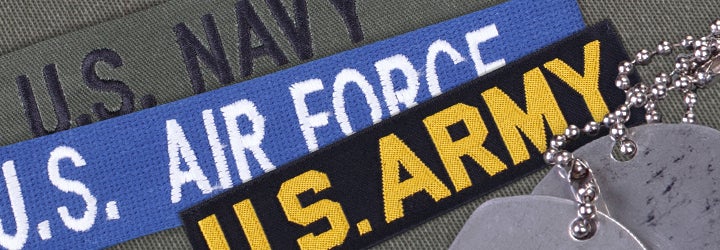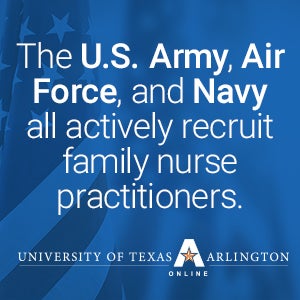
Nurses can serve their country as part of the U.S. military, providing healthcare to military members, their families and people the military helps worldwide. According to Health.mil (the official website of the Military Health System), nearly 30,000 nurses work in the military. The U.S. Army, Air Force and Navy all actively recruit as well as nurse practitioners (NPs) in other specialties. In all three services, nurses can become officers by going through an officer training program.
Army Nurse Corps
The Army Nurse Corps, which includes over 11,000 women and men (including those in the Federal Reserves or the National Guard), is one of the six corps of medical specialists making up the U.S. Army Medical Department. “Family nurse practitioners are a critical component in providing primary health care support for adults and children during humanitarian missions, other contingency operations and peacetime,” according to the U.S. Army recruiting website.

Army Regulation (AR) 40-68 authorizes nurse practitioners to provide medical care in primary, acute and long-term healthcare settings. Although the regulation does not define the NP role in deployed settings, NPs have served in locations such as Iraq.
The U.S. Army recruits nurse practitioners for both active duty and the reserves. Here are the requirements for serving on active duty as a family nurse practitioner (reserve requirements are slightly different):
- Advanced degree in the
- Current, valid and unrestricted nursing license as a family nurse practitioner
- Eligible for a secret service clearance
- U.S. citizen between the ages of 21 and 42
Nurses accepted into the Army complete an Officer Basic Leadership Course. Benefits and incentives for active-duty NPs include the following:
- Army Nurse Accession Bonus: sign-on bonuses of up to $30,000
- Health Professions Loan Repayment Program: up to $120,000 to repay nursing school loans
- Travel opportunities, including humanitarian missions
- No-cost or low-cost medical and dental care for you and your family
- Paid educational opportunities
- 30 days of paid vacation each year
- Noncontributory retirement benefits after 20 years of qualifying service
Air Force Nursing
The Air Force recruiting site states, “Family Nurse Practitioners work autonomously or with other healthcare professionals to deliver complete family-focused care.” They work in a variety of settings on Air Force bases around the world. The Air Force also looks for NPs in other specialties, especially pediatrics, critical care, emergency/trauma and mental health.
The following are the requirements to become an active-duty nurse practitioner in the Air Force:
- Master of Science in Nursing (MSN) degree
- Minimum six months full-time nursing practice in your specialty
- At least 12 months experience as a registered nurse
- A 5.5-week Commissioned Officer training course
- Between the ages of 18 and 47
Like the Army, the Air Force offers a range of benefits for nurses. For the most up-to-date information, talk to a recruiter.
Navy Nurse Corps
Members of the Navy Nurse Corps may deliver nursing care at Navy medical facilities, on Navy ships or as part of humanitarian relief operations around the world. The Navy is particularly interested in recruiting family, pediatric, psychiatric and women’s health nurse practitioners. Requirements and benefits are analogous to those of the Army Nurse Corps, with certain differences in areas like age requirements, scholarship programs and educational loan repayment programs. Both active duty and reserve options are available.
Nurses entering active duty attend the five-week Officer Development School (ODS) in Newport, Rhode Island. Commissioned Navy nurses also serve as nurses for the Marines.
In an interview with ReachMD, family nurse practitioner Captain Linnea Axman talked about her 25-year career in the Navy. She recounts how she has worked in family practice programs at naval medical facilities, in refugee camps, in Kuwait to support Project Iraqi Freedom and in a number of countries as part of the President’s emergency plan for AIDS relief.
The military can offer exciting opportunities and benefits for nurse practitioners who feel drawn to serve their country. If you are considering that option, understand what you are getting into before you sign up. Talk to a recruiter who specializes in recruiting health professionals (sometimes called a Health Professions Accessions recruiter), not the typical military recruiter who focuses on enrolling enlisted people.
The military imposes a structured lifestyle that does not suit everyone. You have to go where the military sends you. The job can be dangerous if you are deployed to war zones or unstable regions. But if you have the desire to contribute and if the opportunities and lifestyle appeal to you, becoming a nurse practitioner in the Army, Air Force or Navy can offer a challenging and rewarding career.
Learn more about The University of Texas at Arlington online MSN – Family Nurse Practitioner program.
Related Articles
- What Is a Family Nurse Practitioner?
- What to Expect as a Nurse Practitioner
- Why family nurse practitioner is a top job
Program Testimonials
- Alexis Turner Wastes No Time Moving Into FNP Role After Earning MSN Online
- Doubling Up: Twins Ashley and Kayla Johnson in MSN FNP Program